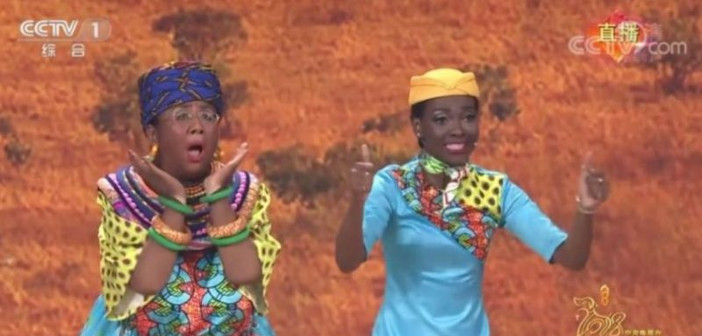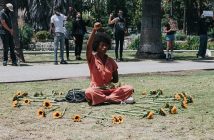For a white, western man, one of the oddest aspects of living in China is that you learn what it’s like to experience racism. Which is not to say that I’ve ever encountered overt abuse, but it’s a salutary experience to be on the receiving end of micro-aggressions; being ignored until all the Chinese customers have been served, for example.
The world’s spotlight turned on Chinese attitudes to race after a well-meaning but horribly misjudged skit in the CCTV New Year Gala. The Gala, believed to be the most watched television program on earth, is a four-and-a-half-hour variety show combining music, comedy, spectacle and flag-waving patriotism. The offending sketch was intended to celebrate the friendship between China and Africa, but featured a Chinese comedienne “blacked up” to play a Kenyan mother, accompanied by a black actor playing her pet monkey.
The danger inherent in complaining about Chinese racism is of course the risk of falling into a similar stereotyping. I should emphasize that incidents of unpleasantness are rare, and that most people are friendly and fair-minded. Any suggestion that one group of people is more prone to racism than others is in itself racist. Wherever you go in the world there will be a few idiots, and a large majority of decent, good people.
However incidents like this raise the question of how to talk about racism with children. Kids are acutely aware of unfairness, and will notice very quickly if people are treating them, or others, differently. However it might be harder for them to appreciate why something that seems harmless and funny, like the CCTV skit, might be hurtful to others.
Teaching children that, while people might look different, talk or dress differently, we are essentially all the same, all human and all of equal value, is easy, and should be fundamental to parenting. But to explain why, for example, “blackface” should be particularly offensive, requires an understanding of history, politics, and culture which might be harder for children to comprehend, and uncomfortable for parents to talk about.
As with everything else in parenting, our children’s age and ability to understand is crucial. My sons, at 9 and 12, are old enough to accept that they are not allowed to use the “F” word just because it sounds ugly in the mouths of children and will make other people think worse of them, not because of any intrinsic wrongness of the word itself. On the other hand, they know well that the “N” word is strictly forbidden to them because it does have the power to hurt; but that there may be contexts where it is OK for others to use it.
It’s important to have age-appropriate discussions, otherwise they risk losing access to centuries of literature. Even a book as brave, as pioneering in its day, as The Adventures of Huckleberry Finn, is now banned in some places because of the portrayal of a black slave by a white author. Better by far, I would argue, to talk about the issues and the problems than simply to pretend that those problems never existed. And there is virtually no pre-20th century book which isn’t problematic in some way.
Some have defended the CCTV skit by insisting that it was innocent, that no harm was meant. And it certainly doesn’t help to conflate the misguided with the malicious. When people nudge their children on the subway, point, and loudly whisper “kan laowai!” it’s usually only because we’re novelties to them. People who haven’t had the opportunity to travel, or live in an international environment, will respond differently to the unfamiliar. My father, who grew up in rural Ireland, used to tell a story about the first time a Protestant came to his village, and he and the other kids hid behind a hedge to spy on the man and see if he had horns and a tail.
So the best thing we can do for our children is try to reduce their ignorance. If they grow up around people of different backgrounds, cultures, and skin tones, then they are less likely to develop prejudices. Being part of an international community helps in that regard, but is no guarantee. However we also need to make sure that children understand the bigger undercurrents of past and power which shape these things. So I’ve also talked to my kids about the fact that, for all we might occasionally be pointed at, less well-treated or charged a higher price because of our background, we still enjoy “white privilege”, even in China.
And we must also teach them to have the courage to speak up. Given the enormous number of writers, producers, media professionals, and censors involved in producing the CCTV Gala, it’s hard to believe not one of them dared to raise a hand and say, “Hold on a minute. Are we absolutely sure this is a good idea?”
Photo: howldb.com




